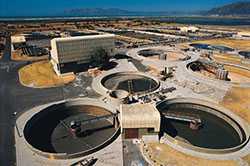Wastewater Management

Centralized wastewater treatment system
Land use decisions related to wastewater management may also affect water quality. Wastewater management deals with collecting, treating, and disposing of wastewater. Treatment systems are classified as follows:
- Centralized
Centralized wastewater systems convey wastewater to a central location for treatment and disposal. They are common in urban areas. - Decentralized
Decentralized wastewater treatment systems treat and dispose of the wastewater onsite or near the point of generation. Types of decentralized wastewater treatment systems include septic systems for individual houses and systems serving clusters of homes or businesses.
Wastewater and Public Health
If they are properly designed, constructed, operated, and maintained, centralized and decentralized wastewater treatment systems can help protect the environment, water quality, and public health. If they are not, they can put public health and the environment at risk. For example, malfunctioning septic systems can contaminate groundwater and surface water, potentially affecting people and natural systems.

Septic system serving a cluster of homes (Source: EPA)
New Approaches
Septic systems serving individual homes need larger lots because of minimum setback distances and the requirement for a repair area. New approaches to wastewater include septic systems that serve clusters of homes or businesses, require less land, and facilitate green space.
Constructed wetlands represent another new approach to wastewater treatment for individual homes, clusters of homes, or communities. They are, however, only one component of treatment systems designed to treat wastewater that has already gone through some initial form of treatment; so design of the entire wastewater treatment system is important. Constructed wetlands are normally the last stage of wastewater treatment. They have the potential of providing recreational areas and wildlife habitat; they can also reduce energy and chemical use.
To be effective, any wastewater system requires appropriate design, construction, operation, and maintenance. When making wastewater decisions, persons working in land use planning, zoning, environmental protection, and wastewater management also can collaborate to consider healthy community design.
For more information:
- Page last reviewed: February 28, 2013
- Page last updated: March 5, 2013
- Content source:


 ShareCompartir
ShareCompartir